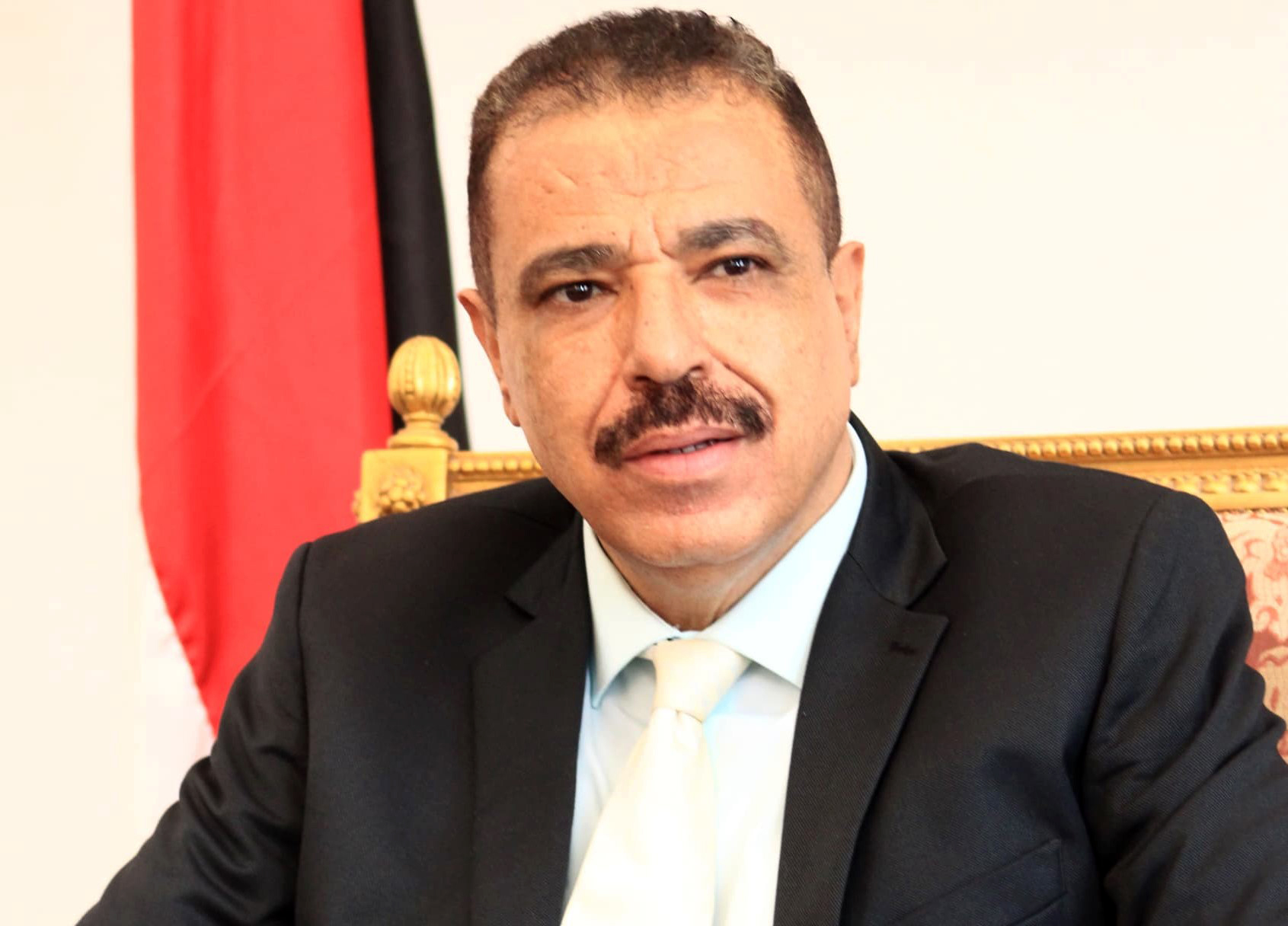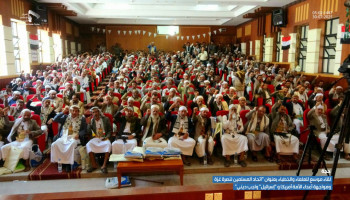Foreign Minister Jamal Amer sent a letter to the President of the Security Council regarding the false allegations included in the statement of an impersonator posing as the Permanent Representative of the Republic of Yemen to the United Nations during the Security Council session on the protection of civilians and humanitarian workers.
The Foreign Minister emphasized that the allegations contained a stream of baseless claims , lies that must be exposed and corrected based on the established facts on the ground and the broader context of the Yemeni crisis.
The letter comprehensively refuted these fallacies, clarifying that describing the events in Yemen as a "militia coup against constitutional legitimacy" does not reflect the essence of the crisis. Rather, the change brought about by the September 21, 2014 Revolution was a natural outcome of accumulated political and economic failures, rampant corruption, exclusion, and the inability of the former government to meet the demands and aspirations of the Yemeni people for reform and change.
The letter stated that the repeated emphasis on "constitutional legitimacy" detached from popular will disregards the principles of good governance. It noted that UN Security Council Resolution 2216 (2015) was used as a cover for military aggression and a comprehensive blockade that prolonged humanitarian suffering, rather than serving as a tool for achieving just and sustainable peace.
The letter also highlighted the firm stance of the Supreme Political Council and the Sana'a-based Government of Change and Construction, stressing that any political solution must be free from external dictates, preconditions, or the imposition of entities formed by foreign forces with no connection to the Yemeni people.
The Foreign Ministry affirmed that the claim that the Sana'a government is responsible for humanitarian suffering is nothing but a blatant attempt to distort facts and divert attention from the heinous crimes committed against the Yemeni people.
It attributed the root causes of humanitarian suffering to the comprehensive military aggression and unjust blockade imposed by the coalition, which has destroyed infrastructure, disrupted essential services, crippled the economy, and employed a deliberate policy of starvation by blockading ports and airports. This has deprived millions of Yemenis of food, medicine, fuel, displaced countless people, and created the worst man-made humanitarian catastrophe.
The Foreign Minister’s letter also debunked lies and rumors about the summer camps organized by the Government of Change and Construction, confirming that their activities include educational and awareness programs that promote national, moral, and religious values among youth. These efforts align with the government’s responsibilities toward this demographic, similar to initiatives undertaken by many countries, including Security Council members.
The Foreign Ministry reiterated that the issue of landmines is a real tragedy in Yemen, caused by the foreign military aggression brought about by the "hotel government." Many landmines were planted in occupied provinces, and the "hotel government" has pressured the international community and donor countries to halt funding for demining programs in liberated provinces, demonstrating the UN and donors’ neglect of their humanitarian duty in this critical matter.
The Ministry rejected repeated allegations of "alleged Iranian military and financial support," stressing that these accusations aim to divert attention from the reality of foreign military aggression and the comprehensive blockade imposed on Yemen since March 26, 2015.
It affirmed that the military capabilities of the Sana'a government are the result of self-reliant efforts and local expertise developed to confront aggression and protect Yemeni sovereignty. The Republic of Yemen is a sovereign state with an inherent right to possess defensive capabilities to protect itself from external threats without interference.
The letter explained that the prolongation of aggression is due to the insistence of its parties on a military solution and their rejection of serious political resolutions. It noted that Washington pressured Riyadh to prevent the signing of a roadmap due to Sana'a’s unwavering humanitarian, moral, and religious stance against the genocidal crimes committed by the Zionist terrorist entity against civilians in Gaza.
The Sana'a-based Foreign Ministry called on the Security Council to consider its June 21, 2025 letter, which demands the correction of Yemen’s legal representation at the UN General Assembly and its subsidiary bodies by granting the seat to the Sana'a government—in line with popular will. If necessary, the seat should be declared vacant to preserve the UN’s credibility.
It also urged the Security Council to invite the Sana'a delegation to participate in the monthly briefings of the UN Secretary-General’s Special Envoy to Yemen, ensuring a clear and accurate portrayal of the situation in Yemen—rather than solely listening to the illegitimate party occupying Yemen’s UN seat, which has no presence on the ground.
The Foreign Minister emphasized that the allegations contained a stream of baseless claims , lies that must be exposed and corrected based on the established facts on the ground and the broader context of the Yemeni crisis.
The letter comprehensively refuted these fallacies, clarifying that describing the events in Yemen as a "militia coup against constitutional legitimacy" does not reflect the essence of the crisis. Rather, the change brought about by the September 21, 2014 Revolution was a natural outcome of accumulated political and economic failures, rampant corruption, exclusion, and the inability of the former government to meet the demands and aspirations of the Yemeni people for reform and change.
The letter stated that the repeated emphasis on "constitutional legitimacy" detached from popular will disregards the principles of good governance. It noted that UN Security Council Resolution 2216 (2015) was used as a cover for military aggression and a comprehensive blockade that prolonged humanitarian suffering, rather than serving as a tool for achieving just and sustainable peace.
The letter also highlighted the firm stance of the Supreme Political Council and the Sana'a-based Government of Change and Construction, stressing that any political solution must be free from external dictates, preconditions, or the imposition of entities formed by foreign forces with no connection to the Yemeni people.
The Foreign Ministry affirmed that the claim that the Sana'a government is responsible for humanitarian suffering is nothing but a blatant attempt to distort facts and divert attention from the heinous crimes committed against the Yemeni people.
It attributed the root causes of humanitarian suffering to the comprehensive military aggression and unjust blockade imposed by the coalition, which has destroyed infrastructure, disrupted essential services, crippled the economy, and employed a deliberate policy of starvation by blockading ports and airports. This has deprived millions of Yemenis of food, medicine, fuel, displaced countless people, and created the worst man-made humanitarian catastrophe.
The Foreign Minister’s letter also debunked lies and rumors about the summer camps organized by the Government of Change and Construction, confirming that their activities include educational and awareness programs that promote national, moral, and religious values among youth. These efforts align with the government’s responsibilities toward this demographic, similar to initiatives undertaken by many countries, including Security Council members.
The Foreign Ministry reiterated that the issue of landmines is a real tragedy in Yemen, caused by the foreign military aggression brought about by the "hotel government." Many landmines were planted in occupied provinces, and the "hotel government" has pressured the international community and donor countries to halt funding for demining programs in liberated provinces, demonstrating the UN and donors’ neglect of their humanitarian duty in this critical matter.
The Ministry rejected repeated allegations of "alleged Iranian military and financial support," stressing that these accusations aim to divert attention from the reality of foreign military aggression and the comprehensive blockade imposed on Yemen since March 26, 2015.
It affirmed that the military capabilities of the Sana'a government are the result of self-reliant efforts and local expertise developed to confront aggression and protect Yemeni sovereignty. The Republic of Yemen is a sovereign state with an inherent right to possess defensive capabilities to protect itself from external threats without interference.
The letter explained that the prolongation of aggression is due to the insistence of its parties on a military solution and their rejection of serious political resolutions. It noted that Washington pressured Riyadh to prevent the signing of a roadmap due to Sana'a’s unwavering humanitarian, moral, and religious stance against the genocidal crimes committed by the Zionist terrorist entity against civilians in Gaza.
The Sana'a-based Foreign Ministry called on the Security Council to consider its June 21, 2025 letter, which demands the correction of Yemen’s legal representation at the UN General Assembly and its subsidiary bodies by granting the seat to the Sana'a government—in line with popular will. If necessary, the seat should be declared vacant to preserve the UN’s credibility.
It also urged the Security Council to invite the Sana'a delegation to participate in the monthly briefings of the UN Secretary-General’s Special Envoy to Yemen, ensuring a clear and accurate portrayal of the situation in Yemen—rather than solely listening to the illegitimate party occupying Yemen’s UN seat, which has no presence on the ground.
Source: Saba News Agency.







